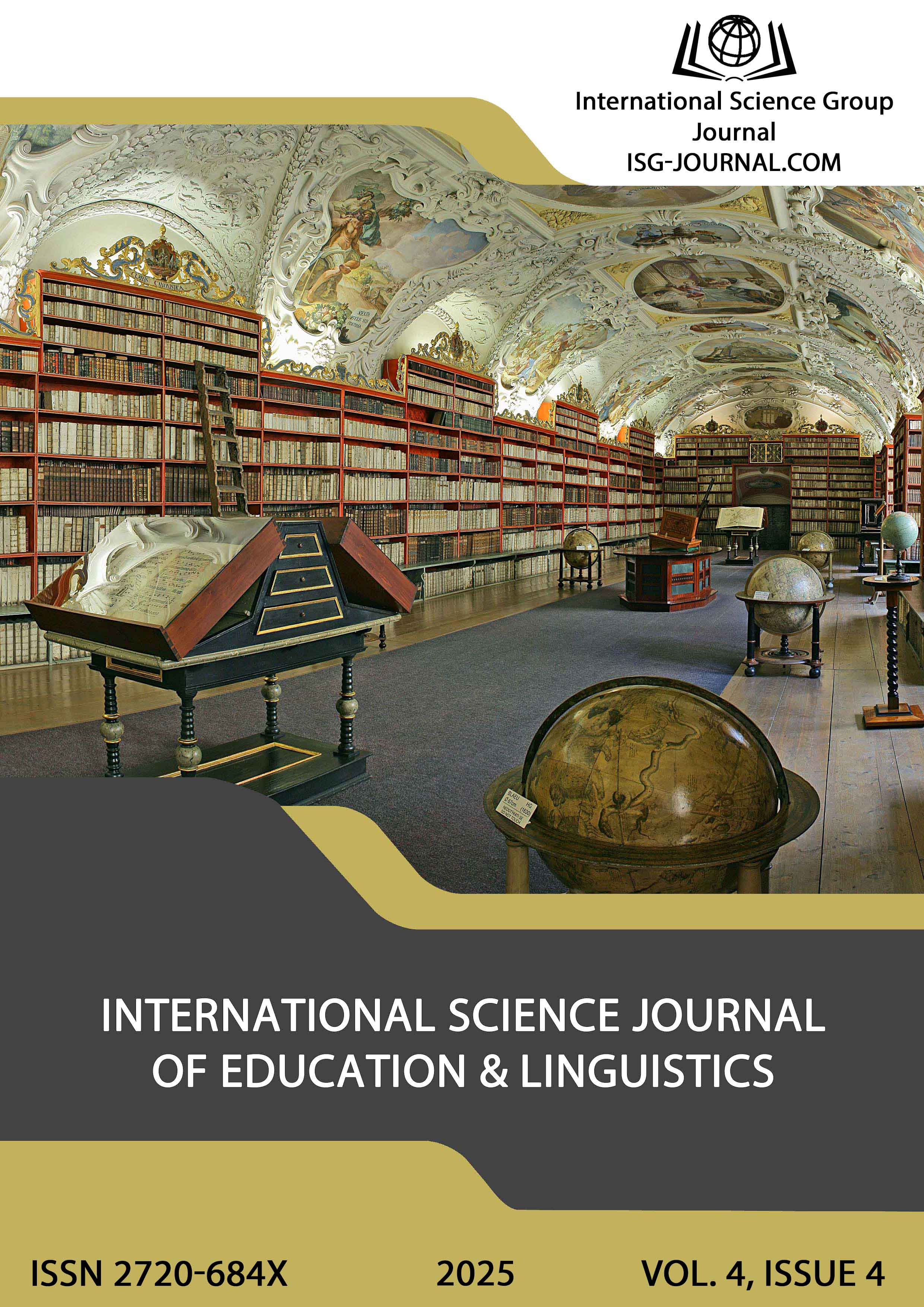Pedagogical conditions of forming professional competence of future teachers of music art using digital technologies
DOI:
https://doi.org/10.46299/j.isjel.20250404.03Keywords:
professional competence, information and communication technologies, teachers of musical art, digital technologies, pedagogical conditionsAbstract
The article reveals the key pedagogical conditions for the formation of professional competence of future teachers of music (integration of digital technologies into the educational process, application of a personality-oriented approach, which involves taking into account the individual characteristics of applicants, ensuring practice-oriented learning; considers the factors of technical progress that contributed to the creation of computer programs MuseScore, Finale, Logic Pro and Ableton Live for working with musical material, which facilitate the process of processing and arranging, recording and editing musical compositions; identifies the principles of learning using multimedia technologies; analyzes the development of Internet technologies and the availability of cloud services that contribute to the expansion of distance learning, interactive platforms and online courses, which will allow future teachers of music to master new teaching methods. The importance of developing information and communication competence, critical thinking, creativity and readiness to use digital tools in professional activities is emphasized. It is revealed that the effective formation of professional competence requires harmonious combination of traditional methods with innovative digital technologies. Modern approaches to the integration of information and communication technologies into the process of professional training are considered, principles and methods that contribute to the development of professional competencies are analyzed. Special attention is paid to the principles of informatization of training, clarity, optimal choice of teaching aids, as well as activation of musical and creative activity of applicants. Examples of the use of digital technologies in the educational process are given and their impact on the formation of professional competence of future teachers is determined. By analyzing scientific publications and empirical studies, the powerful potential of interactive digital technologies for their use in the training of teacher-musicians in modern conditions is investigated.References
Белінська Т. В., Кравцова Н. Є., Дабіжа К. Л., Плакидюк О. Ю. (2021). Психолого-педагогічні умови формування професійної компетентності майбутніх учителів музичного мистецтва засобами міждисциплінарної інтеграції. Науковий часопис НПУ імені М. П. Драгоманова. С. 26-29.
Гаврілова Л. Г. (2015). Принципи формування професійної компетентності майбутніх учителів музики засобами мультимедійних технологій. Інформаційні технології і засоби навчання. Том 46. №2. С. 45-55.
Жорняк Б., Томашівська М. (2018). Педагогічні засади та принципи формування професійної компетентності майбутніх учителів музики засобами українського народного музичного мистецтва. Педагогіка. Актуальні питання гуманітарних наук. Випуск 21, том 1. С. 134-138.
Колесник Н. (2024). Цифрові технології та штучний інтелект у дизайні й освіті: інновації та перспективи. Design, Visual Art & Creativity: Modern Trends and Technologies. № 2. С. 14-17.
Коломієць В. А., Савастру Н. І., Шевченко Г. В. (2025). Мистецька освіта як інструмент розвитку творчого потенціалу: сучасні підходи. Педагогічна Академія: наукові записки, № (14). URL: https://pedagogical-academy.com/index.php/journal/article/view/606/493
Мартинюк А. (2022) Формування інформаційно-комунікаційної компетентності майбутніх учителів музичного мистецтва. Професіоналізм педагога: теоретичні й методичні аспекти. Випуск 1(17). ДВНЗ «Донбаський державний педагогічний університет». Слов’янськ. С. 192-200. DOI: https://doi.org/10.31865/2414-9292.17.2022.259987
Острецова Т., Острецов Д. (2024). Синергія мистецтва і техніки: вектори розвитку музичних інформаційних технологій. Open educational e-environment of modern University. No 16. С. 106-119.
Созінова В. (2022). Поняття та структура професійної компетентності майбутніх учителів музичного мистецтва. Мистецтвознавство. Актуальні питання гуманітарних наук. Випуск 49, том 2. С. 34-39.
Теплова О., Новосад А. (2024) Дидактичні умови використання інформаційно-комунікаційних технологій у процесі підготовки майбутніх учителів музичного мистецтва. Молодь і ринок. №1 (221). С. 132-136.
Ченьцзи С. (2024). Педагогічні умови і методи формування творчої компетентності майбутніх учителів музичного мистецтва. Актуальні проблеми мистецької педагогіки. Південноукраїнські мистецькі студії. №3 (6). С. 46-51.
Яловський П. М. (2019). До проблеми формування професійної компетентності майбутніх учителів музичного мистецтва: сучасний стан. Теорія і методика професійної освіти. Збірник наукових праць «Педагогічні наки». № 86. С. 391-394.
Artemenko A. (2021). Pedagogical and Psychological Science and Education: Transformation and Development Vectors: Collective Monograph. Riga, Latvia: Baltija Publishing.
Azhari B., Fajri I. (2021). Distance learning during the COVID-19 pandemic: School closure in Indonesia. International Journal of Mathematical Education in Science and Technology, 53(7), 1934-1954. DOI: https://doi.org/10.1080/0020739X.2021.1875072
Budianska V. А. (2025). Development of professional competence of the head of a general secondary education institution in the context of digitalisation of the educational environment. Інноваційна педагогіка: науковий журнал. Одеса, Видавничий дім «Гельветика. Вип. 79. Т. 1.С. 147-153.
Stevens C. (2024). Teachers and teaching: pedagogy, digital skills and professional development. Open Learning: The Journal of Open, Distance and e-Learning, 40(1), 1-3. DOI: https://doi.org/10.1080/02680513.2024.2436665
Downloads
Published
How to Cite
Issue
Section
License
Copyright (c) 2025 Khrystyna Melnyk

This work is licensed under a Creative Commons Attribution 4.0 International License.





